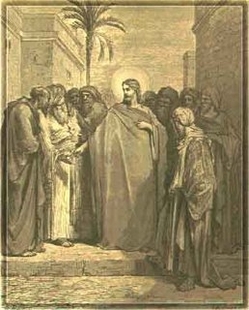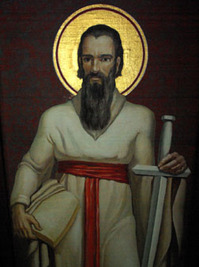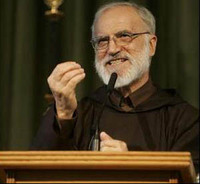A question on the bible and the nature of Tradition always surfaces. Many of those who follow the Protestant line dismiss the intimate connection Tradition that the Catholics and Orthodox make viz. the bible. The magisterial reformers of the 16th century (Luther, Zwingli) led Christians astray by teaching that sola scriptura was a true doctrine taught by the bible. No such thing. What we now come to understand as sacred Scripture found in the publication called The Bible was developed by the Church… the Church did NOT come out of the Bible. History teaches us this fact. History that Evangelicals refuse to admit. The Church, therefore, predates the New Testament, and the Bible. Tradition trumps Scripture. After all, who decided what the Bible would be? The Church, in Council.
In defense of biblical tradition here is but one support: “Beloved, while I was very diligent to write to you concerning our common salvation, I found it necessary to write to you exhorting you to contend earnestly for the faith which was once for all delivered to the saints” (Jude 3).
Holy Tradition assists us in interpreting the words of sacred Scripture. One fact, Divine Revelation, which we accept with that faith which we owe to God alone, was completed with the death of the last Apostle, St. John. At the Council of Trent the Council Fathers taught: Hence, too, that meaning of the sacred dogmas is ever to be maintained which has once been declared by Holy mother Church, and there must never be any abandonment of this sense under the pretext or in the name of a more profound understanding. May understanding, knowledge and wisdom increase as ages and centuries roll along, and greatly and vigorously flourish, in each and all, in the individual and the whole Church: but this only in its own proper kind, that is to say, in the same doctrine, the same sense, and the same understanding. AND yet, it is also true to say that Tradition gives us a renewed sense of what we believe and hold to be True about our divinely revealed faith. Doctrine, according to the Magisterium develops but does not reject the Truth nor take up modernist teachings to explain what is revealed by the Lord. Offering an interpretation of John 16:12-13: “I have yet many things to say to you, but you cannot bear them now. When the Spirit of truth comes, he will guide you into all the truth,” Joseph Ratzinger speaks of “livingness” of tradition through all the ages, and not merely at the time of the Apostles and that’s it.
In his Commentary on Vatican II’s document Dei Verbum, Joseph Ratzinger wrote:
The dynamic concept of tradition, with which the Council here develops its positive conception of traditio, was strongly attacked from two quite opposite directions. On the one hand, Cardinal Ruffini rejected it from his position of traditionally neoscholastic theology, but on the other, Cardinal Leger attacked it from an ecumenical standpoint. In spite of the sharp division in their general theological orientations, the arguments of these two Council fathers were astonishingly similar Ruffini firmly emphasized the idea of revelation being concluded with the death of the last Apostle, rejected the idea of including disciples of the Apostles among the origins of revelation, and opposed the idea of a living and growing revelation, for, in accordance with the text of Trent and Vatican I, he considered that this should be mentioned only in connection with a strong emphasis on the strict unchangeability of a revelation that had been concluded once and for all, with which he referred to an appropriate text by Vincent de Lerins, quoted at both Councils. In the concept of the schema, and especially in its emphasis on spiritual experience as a principle of the growing knowledge of revelation, he detected theological evolutionism, condemned as modernism by Pius XII. In another tone and with other reasons Cardinal Leger insisted on the same point, He found that the Schema, especially in its idea of progress, which seemed to refer not only to the knowledge of tradition, but tradition itself (Haec … Traditio … proficit), blurred the strict distinction between apostolic and post-apostolic tradition and endangered the strict transcendence of divine revelation when it was confronted with the statements and actions of the teaching office of the Church. The Cardinal was concerned that the Church should bind itself firmly to the final and unchangeable word of God, that does not grow, but can only be constantly assimilated afresh and cannot be manipulated by the Church. The Theological Commission considered the question carefully, but decided not to make any major alterations in the text. It pointed out that the clause ” … Traditio proficit” is explained by a second clause “crescit … tam rerum quam verborum perceptio“, i.e. the growth of tradition is a growth in understanding of the reality that was given at the beginning. (Commentary pp.186-187)
In another place Tradition is expounded upon in this manner by Pope John Paul II, in the Motu Proprio Ecclesia Dei when he about the error:
The root of this schismatic act can be discerned in an incomplete and contradictory notion of Tradition. Incomplete, because it does not take sufficiently into account the living character of Tradition, which, as the Second Vatican Council clearly taught, “comes from the apostles and progresses in the Church with the help of the Holy Spirit. There is a growth in insight into the realities and words that are being passed on. This comes about in various ways. It comes through the contemplation and study of believers who ponder these things in their hearts. It comes from the intimate sense of spiritual realities which they experience. And it comes from the preaching of those who have received, along with their right of succession in the episcopate, the sure charism of truth”.
Let me suggest reading a good and essential book: Joseph Ratzinger, God’s Word: Scripture, Tradition, Office (Ignatius Press).
Orthodox Abbot Tryphon offers this reflection on Holy Tradition which supports the proper interpretation of the Bible:
Many evangelical protestants see Holy Tradition as standing in direct contrast to Scripture, as though Tradition is always relegated to “the traditions of men”. However, there are numerous references in Holy Scripture to Holy Tradition. For example:
“Many have undertaken to draw up an account of the things that have been fulfilled among us, just as they were handed down to us by those who from the first were eyewitnesses and servants of the word. With this in mind, since I myself have carefully investigated everything from the beginning, I too decided to write an orderly account for you, most excellent Theophilus, so that you may know the certainty of the things you have been taught (Luke 1:1-4).”
It must be noted that in this instance, the oral word preceded the written word. hence becoming Holy Tradition.
In John 20:30-3, it is revealed, “Jesus performed many other signs in the presence of his disciples, which are not recorded in this book”, and in John 21:25, we read, “Jesus did many other things as well. If every one of them were written down, I suppose that even the whole world would not have room for the books that would be written”. One of my personal favorite passages regarding Holy Tradition is found in 2 Thessalonians 2:15, “So then, brothers and sisters, stand firm and hold fast to the teachings we passed on to you, whether by word of mouth or by letter.”
Holy Tradition is not apart from the Bible, but supports the proper interpretation of the Bible. Holy Tradition emanates from Christ Himself, and is expressed by the Apostles, the Holy Fathers, and the Church. The Fathers, in fact, are the very guardians of the Apostolic Tradition, for they, like the Apostles before them, are witnesses of a single Truth, which is the Truth of the God-man, Jesus Christ. Since Christ is one, unique, and indivisible, so also is the Church unique and indivisible. The Church is the incarnation of the incarnated God-man, Jesus Christ, and will continue through the ages, and even throughout all eternity.


